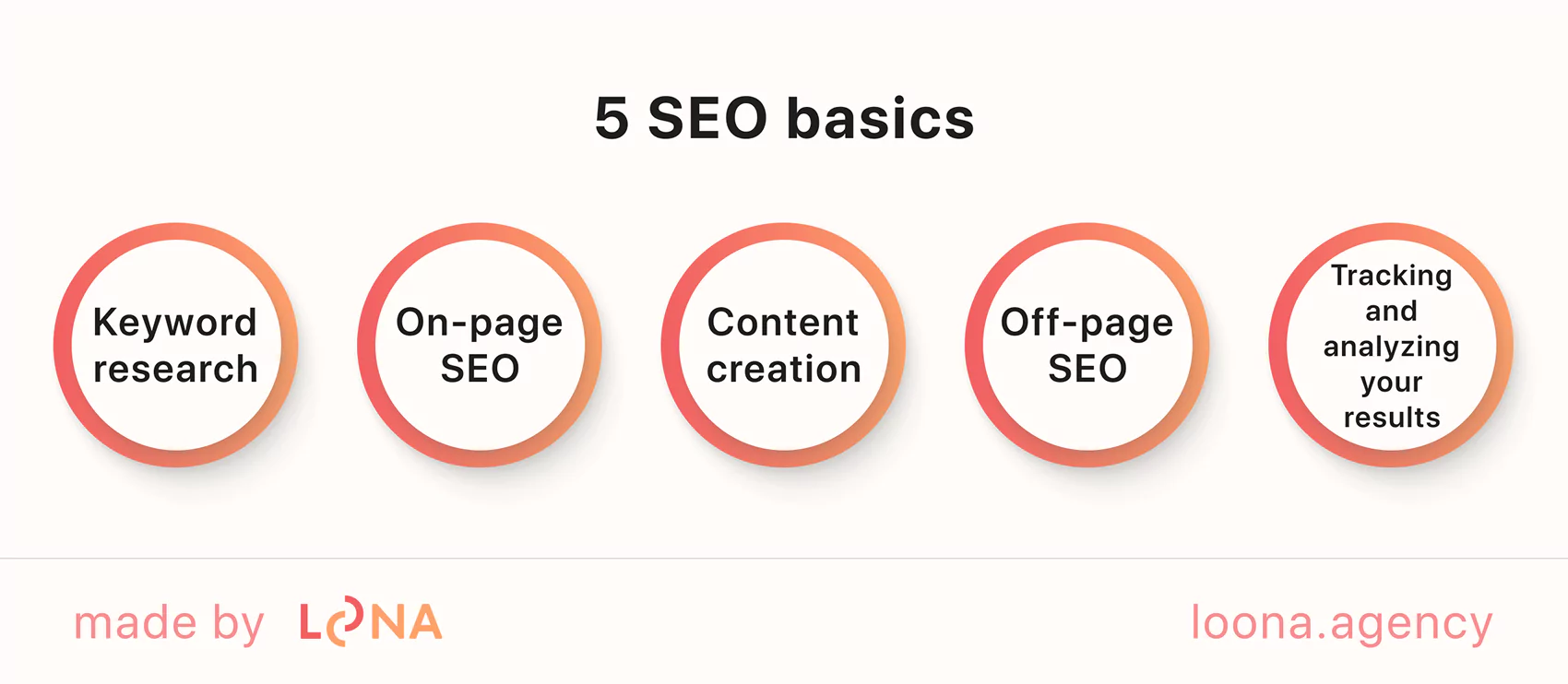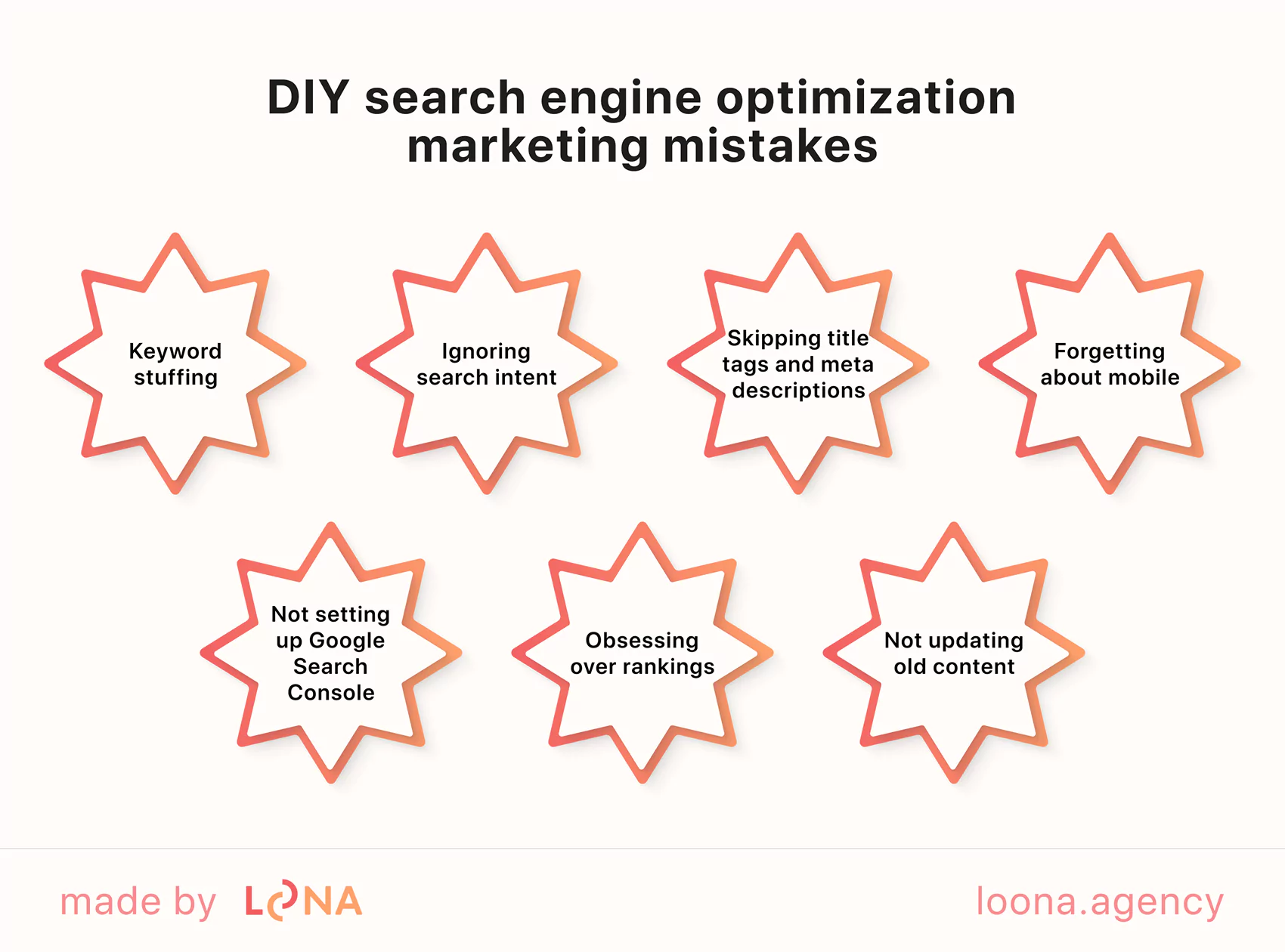DIY SEO (do it yourself search engine optimization) is possible on your own with the right approach. If you want to know if you can do SEO by yourself, you’re in the right place. Loona’s guide is a simple look at how to start from scratch when building your online profile.
In this SEO do it yourself guide, we’ll simplify the fundamental blocks of self SEO. You’ll discover how to speak to your audience with smart keyword research, and get your website optimized. We’ll also touch on content creation, how to build your online reputation through off-page tactics, and monitor your progress with data-driven tracking and analysis tools.
Ready to take charge of your online success? Dive in getting your web presence to work for you. By finishing reading this do it yourself SEO guide, you’ll be well-equipped with the tools and expertise to carry out your own SEO strategy effectively. When you’re done reading this do it yourself SEO guide, you’ll have all the tools and knowledge you need to run your own SEO campaign well.
Is it possible to do SEO yourself?
When it comes to SEO, the first thing anyone wants to know is whether one can ensure DIY SEO optimization. And the answer is yes—but it needs time, patience, and a desire to learn. We know it’s going to look intimidating at first, especially technical slang and complex strategies, which seem to be a whole other language.
But then, as with learning any new skill, starting at the ground level and gradually building your knowledge make the work feasible and even pleasant. Most of us are familiar with the stress of achieving everything flawlessly at once, and it’s understandable to feel uncertain about doing something as important as SEO DIY.
Although it’s rewarding to do it yourself SEO, employing a professional SEO company can significantly accelerate your progress and remove the frustration of trial and error. Experts come with a wealth of experience, awareness of the latest search engine algorithms, and ability to apply powerful tools and proven methods accessible only with years of working in the field.
They can recognize quick victories, avoid pitfalls that trap many newbies, and constantly improve your strategy based on live feedback. You get to realize real gains more rapidly, freeing you up to focus on building your business instead of dealing with technical SEO self.
A professional team also enjoys the advantage of a fresh, unprejudiced perspective. They notice rare opportunities and modify their method based on the particular needs of your business as well as market trends. Furthermore, professional SEO services provide ongoing support and open reporting. You gain a clear overview of progress and development areas.
In essence, while DIY SEO marketing is indeed achievable, it’s when you collaborate with experts. This way, you benefit from tailored abilities, strategic recommendations, and an even more optimized path to long-term success. The best part is that with a wisely developed plan, you can start seeing tangible progress. Don’t forget that every pro started out somewhere, and every little thing you do today is an investment in your future.
SEO DIY guide: Understanding the 5 SEO basics
While a full-cycle SEO is more broad and complicated, there are five basic things that you can do yourself. These include learning the rudiments of SEO, entering sensible keyword research, maximizing your on-page elements, creating stellar content, and building your site’s reputation off-page. These things each offer a clear, actionable step toward can make you more prominent online without overwhelming you.
Let’s take them in turns. We’ll touch on each key factor, giving you an instant impression of what each is. That way, you can see how these simple but fundamental elements create a solid and successful SEO do it yourself strategy for your business.

Keyword research: Finding your audience
DIY SEO for small business, mid-sized companies, or enterprises starts with defining what toys audience searches for. Keyword research is likely the most basic part of internet marketing as it tells you the phrases and words that your target audience uses to find products or services. Keyword research tells you what your future clients need and want, while also informing you about how to create proper content that will attract them.
Keyword research can be hard for someone who has never done it before, but breaking it down into steps makes it easier to understand and more useful than ever.
- Start by revealing with ideas related to your business and the problems your customers are trying to solve.
- Make a list of words and sentences that you’ve learned people will use in their search.
- Once you have a broad list, you can use Google Keyword Planner, Ahrefs, or Ubersuggest to narrow it down and find out how often people search for each keyword and how much competition there is.
- Optimize a mix of broad and long-tail keywords because the latter usually have higher search intent and could bring in more targeted traffic.
- Once you have gathered your keywords, organize them into groups that represent different customer interests or business sectors.
- Review and revise your keyword list from time to time, as consumer behavior and search behaviors evolve over time.
If you put in the time and effort, you can learn to properly use keyword data and adjust your do SEO yourself plan to better reach and engage your target audience. You can attract the right visitors and set the stage for all your future SEO efforts by investing time into understanding proper keyword research methods. Keyword research works the most effectively through consistent refining.
On-page SEO: Optimizing your website
On-page SEO, which is also known as on-site SEO, is creating better performing pages on your website. They are supposed to show up higher in search engine results and get more targeted viewers. It encompasses a wide array of tactics and recommendations meant to simplify your content for human readers and search engines alike. Knowing search engine optimization do it yourself is one of the most important things you can do to start doing DIY SEO.
Appealing content
Start with your content. The first step in on-page SEO is making sure your writing is valuable, easy to understand, and engaging. Think about what your audience wants and give it to them in a clear and helpful way. As you write, include relevant keywords in your titles, headings, and body text naturally—just like you’re having a conversation with someone who’s looking for exactly what you offer. This tells people and search engines what your page is about.
An intuitive structure
Equally important is the structure of your website. A well-organized site with clear navigation, properly styled headings, and logical internal links makes it easy for search engines to crawl your pages and for users to find what they need quickly. Don’t forget about your meta tags—title tags and meta descriptions are a snapshot of your content in search results, guiding both readers and search engine bots.
Technical side
Beyond content and structure, there are a few technical SEO elements that can make a big difference. Add descriptive alt text to images, ensure your site loads quickly, and make it mobile-friendly to improve the overall user experience. Structured data gives search engines extra clues about your content so they better understand your site.
Analytics tools are your friends here. By monitoring changes in your rankings and user behavior, you can continually test and refine your on-page elements. Take the time to perfect these details to take the most through visibility and a website that meets your audience’s expectations.
Content creation: Behind the scenes
Digital marketing strategies can’t function without content development, which entails much more than just putting words on a page. Maintaining an engaging tone while writing accurately and professionally even about the most far from emotional component issues, can be a challenge. However, a human touch improves any subject, so it’s important to include the emotional component of content development in everything you create.
Professionals writing on technical topics should keep in mind that their readers search for more than mere facts. They want their difficulties to be acknowledged and understood, have their problems validated, and have their questions answered.
Equally important is providing clear explanations of complicated ideas and how much work is required to complete different kinds of projects. Giving examples from your own life can help people relate to and trust what you’re writing. Because of this openness, your audience will feel more invested in what you have to say, which will lead to a better grasp of the subject matter and less anxiety around your company performance.
- The ultimate advice: When you create selling content, the most important thing is to put yourself in the shoes of your readers. Consider whether you would want to read the page you create all the way through. This way, you create a much more fascinating and engaging conversation that will help them learn and grow as people.
Off-page SEO: Building your reputation
Off-page SEO tactics improve your DIY search engine optimization rankings on sites other than your own. To become respected in the digital world, you need to use techniques that send signals that search engines find useful.
Search engines think your website is a good source when other good websites link to your content or talk about your brand. Building trust through real conversations and relationships on the web is more important than just getting links, but both are necessary for the process.
Off-page SEO might seem scary to people who are new to it because it involves the whole digital space. The key is to break it up into smaller jobs that you can handle.
- First, you should connect with other sites in your area that you can trust. Guest blogging, forum activity, and social media interactions with influencers are some of the more realistic ways to measure success. By doing so, you improve your reputation with possible clients and get more traffic from referrals. In addition, they make connections possible.
- Also, if you want to reach people in a certain area, neighborhood citations and directory listings may help your reputation. By being thorough, you show search engines that your site is respected by both big names in the business and people in your own field.
The long-term benefits of off-page SEO are much greater than the time and work needed to set it up. In addition to on-page SEO, you can use off-page strategies to slowly get more relevant websites and pages to talk about and link to yours. With tracking tools in this step as well, you can monitor your work and learn what works and what doesn’t.
Remember that off-page SEO builds a strong, long-lasting online image for your brand when used with other SEO strategies. It’s not about quick fixes, though – it takes work that is planned and ongoing.
Tracking and analyzing your results
An essential part of any successful SEO plan is monitoring and evaluating the outcomes. Though we were talking about it in other sections – it deserves the separate section due to its enormous impact on your DIY SEO optimization success.
You need this information to put your time and energy where it will do the most good. If you’re just starting out in search engine optimization, learning how to understand and react to analytics can turn chaos into clarity. With such an approach, you have a path to hone your approach based on your audience’s preferences.
Quantitative analysis is more than just gathering data. It’s also about making sense of that data to find ways to make your efforts better over time. If you want to know how people use your site, which pages are popular, and where they’re coming from, you have to start monitoring your SEO DIY performance.
To put it into action, you can track your outcomes by keeping an eye on organic traffic, bounce rates, and conversion metrics with specialist systems like Google Search Console or Google Analytics. You can find out what strategies worked and what didn’t with them. Regular reviews of this data will allow you to fine-tune your keyword strategy, revise underperforming content, and optimize pages to better match user intent.
To create a long-term plan, adopt a systematic method to tracking and analysis. To maintain a competitive edge in the digital realm, one must constantly study and adapt. Closely monitor your analytics, and gain a better grasp of how your SEO efforts are converting into tangible outcomes. This, in turn, will inspire you to try new things and be creative.
DIY SEO marketing most common mistakes
Before we dive into what not to do, here’s a comforting truth: everyone makes mistakes when learning SEO. It’s part of the process. The key is to learn from those mistakes before they consume your time and money. DIY SEO doesn’t have to feel like a next step guesswork—especially when you know there are many red flags to watch out for.
Below are the most common beginner SEO mistakes that are totally avoidable once you spot them.

1. Keyword stuffing
Cramming your target keyword into every sentence might feel like you’re helping Google figure out what your page is about—but you’re actually doing the opposite. Keyword stuffing makes your content sound robotic and can hurt your rankings. Instead, focus on natural placement. Talk to your audience, not just the search engines. Add keywords in where they make sense.
2. Ignoring search intent
One of the fastest ways to waste your content efforts is to misunderstand what your audience is actually searching for. Just because a keyword has high traffic doesn’t mean it fits what your audience needs. If someone types “best budget laptops,” they’re probably not looking for a deep dive on central processing unit (CPU) architecture—they want a list of affordable, solid choices. Make sure every piece of content directly answers the query behind the keyword.
3. Skipping title tags and meta descriptions
It’s easy to overlook meta tags when you’re focused on the big stuff. But these little snippets are your first impression in the search results. Don’t let Google auto-fill them with something awkward. In this SEO DIY guide, we highly want to emphasize that a compelling, keyword-rich title and meta description not only helps your SEO, it gets more people to click.
4. Forgetting about mobile
In a mobile world, your site has to look and function well on phones. If your site takes ages to load or your buttons are too tiny to tap, you’re losing users as well as ranking potential. Always test your site on mobile, and aim for a clean, responsive design that loads quickly.
5. Not setting up Google Search Console
Skipping this makes it much harder to succeed. Google Search Console is free, powerful, and designed to help you succeed. It shows you how your site performs, what people search to find you, and flags any issues that might hurt your SEO. Set it up on day one, and make it your new best friend.
6. Obsessing over rankings
Yes, rankings matter. But chasing that #1 spot for a single keyword while ignoring overall growth, traffic quality, and conversions can lead to frustration. Focus on progress over perfection. You want to build a sustainable, long-term strategy—not a short-lived unreliable schedule.
7. Not updating old content
Publishing great content once is awesome—but leaving it to age forgotten? Not so much. Search trends change, competitors publish better pieces, and your content might lose relevance. Apply the most effective marketing metrics to get the most precise analytical data and refresh older articles regularly to keep them in the game.
Still, SEO success doesn’t mean never making mistakes—it means not repeating them. With a bit of awareness and a lot of patience, you’ll avoid these common traps and stay focused on building an SEO DIY strategy that grows with you.
Delegate and thrive faster: Loona’s case
Loona is a full-service marketing agency dedicated to helping service-based companies unlock their true growth potential. With solid foundations in SEO and content strategy, we help brands stop guessing and start growing. Our team specializes in simplifying complex problems with straightforward, fact-based plans—because we believe that great marketing isn’t a question of doing more, but doing what gets results.

When Avva Experience—a hungry startup that offers virtual team-building adventures—wanted to grow their online visibility in the US and UK, they were faced with a familiar stumbling block. The main issue revolved around mediocre search rankings, fragmented content, and sparse backlinks. That’s when they turned to Loona. In a few months’ time, we refocused their organic position. SEO is no longer a burden, but the primary driver of discovery.

Here’s exactly what we provided:
- Advanced SEO audit – We pinpointed the weak spots in on-page, off-page, and technical SEO.
- SEO optimization – Strategic keyword mapping, meta-optimized information, and structural improvements.
- Link building strategy – We rebuilt their backlink profile with high-quality, relevant links.
- Content marketing – We rephrased and added to existing content to drive meaningful traffic and leads.
- Conversion boost – Streamlined UX elements and page structure to convert more organic traffic.
- Blog strategy & production – Created a consistent content calendar based on topical, search-optimized content.
- Site recommendations – Recommended social integration, developed a Careers and Authors pages, and pointed internal linking.
A whopping +950% boost in organic traffic and a +100% boost in leads—all because of making SEO work and brand identity formation strategically.
Conclusion
You’ve just done something very important that will help you take charge of your digital growth. You now know search engine optimization how to do it yourself. Save this SEO do it yourself guide to manage every part of DIY SEO for small business, middle-sized companies, or enterprises. There is still more to discover, but at least you don’t have to guess anymore.
Don’t forget that SEO is a process, not a goal. When you follow your own SEO do it yourself guide, you can grow as your website does. You get more seen, heard, and trusted online with every piece of content you post, term you focus on, and backlink you earn.
You don’t have to go it alone, though, if you get stuck or just want to move faster. When it comes to your business, Loona can help you turn SEO from a source of stress into a source of success. Whether you need a second check of a solution that is fully controlled, our expert team is here to help you do better and get results that speak for themselves.
Do you want to improve your SEO? Let’s talk. You can consult with Loona about SEO for free and find out how we can help you turn search traffic into steady growth.
FAQ
01 How to do SEO yourself?
Find content-relevant keywords to DIY SEO marketing. See what others are searching for with free tools like Google Keyword Planner. Put those keywords in your website's titles and content. Finally, generate and promote exceptional content to build links.
02 Can I do SEO myself for free?
You can do SEO for free! Many free tools, like Google Search Console and Google Analytics, can help. There are also many blogs and videos to help. Just start, follow some tips, and see your site grow! Or turn to a professional marketing agency to get an even higher return on investment.
03 How do I start my own SEO?
Start with articles or videos to understand the basics. Check your site's performance with Google Analytics. Then, improve your site's content and keywords. In case of struggles – Loona Agency can give you the advice you look for.
04 How can I teach myself SEO?
Learning SEO is fun! Explore online free courses and tutorials. Practice what you learn on your website. Use SEO forums to ask queries and obtain advice. Keep learning and experimenting—you'll get it soon!
Love what you’re reading? Sign up for our newsletter to get our newest articles, helpful tips, and fresh marketing updates delivered right to you. No spam, just the good stuff.











